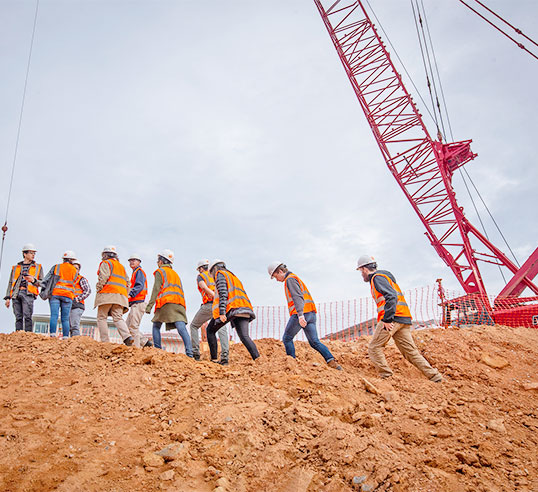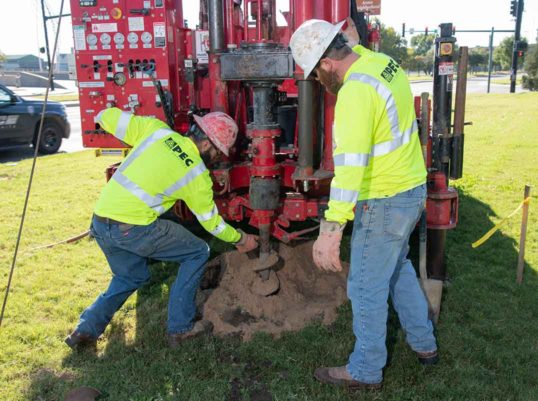Necessary Qualities of Effective Civil Consulting Engineers
Necessary Qualities of Effective Civil Consulting Engineers
Blog Article
Comprehending the Comprehensive Function of Geotechnical Engineers in Ground Investigation and Soil Evaluation for Building And Construction Tasks
Geotechnical engineers are essential to the success of building and construction projects, offering vital understandings through extensive ground examinations and soil evaluation. Their expertise in examining dirt behavior and using sophisticated screening techniques notifies essential decisions that support structural stability and security.
Role of Geotechnical Designers
The pivotal role of geotechnical engineers in building jobs can not be overemphasized, as they provide vital understandings right into soil actions and site problems. These specialists are tasked with analyzing the suitability of the ground for different kinds of structures, guaranteeing safety and security and stability throughout the construction procedure. Their proficiency encompasses a variety of activities, including site characterization, soil sampling, and research laboratory screening, which are essential for figuring out the physical and mechanical properties of the soil.
Geotechnical engineers use their findings to establish fundamental designs that suit load-bearing needs and reduce risks associated with soil slope, negotiation, and liquefaction stability. They play a vital function in recognizing prospective risks, such as groundwater variations and contamination, which can substantially impact job stability. They collaborate with engineers, civil designers, and specialists to make sure that geotechnical considerations are incorporated into the overall layout and construction phases.
Ground Investigation Methods
Ground examination strategies form the foundation of geotechnical engineering, making it possible for engineers to get a comprehensive understanding of subsurface problems. These methods are vital for assessing soil residential properties, determining groundwater levels, and identifying prospective geological threats.
Common methods include borehole drilling, which enables the removal of soil examples at numerous depths, supplying critical information for analysis. Furthermore, sitting screening techniques, such as Standard Penetration Examinations (SPT) and Cone Infiltration Tests (CPT), are used to evaluate dirt toughness and thickness straight in the ground.
Geophysical methods additionally play a substantial function in ground investigations. Methods such as seismic studies and electric resistivity tomography assistance assess subsurface qualities without extensive excavation. geo tech engineering. These non-invasive techniques are particularly useful in sensitive or large locations where disturbance must be reduced
Moreover, exploratory trenches can be excavated to visually check dirt layers and determine any type of anomalies. Each of these methods adds one-of-a-kind understandings, permitting geotechnical engineers to create accurate site evaluations and educate design decisions. In recap, a combination of these ground examination techniques is crucial for effective building projects, ensuring security and structural integrity.
Soil Analysis Approaches
Soil evaluation techniques are critical for recognizing the physical and chemical buildings of soil, which straight affect the style and building of foundations and various other structures. Different strategies are utilized to evaluate soil characteristics, ensuring that geotechnical engineers obtain accurate information for informed decision-making.
One commonly used technique is grain dimension evaluation, which establishes the distribution of bit sizes within a dirt example. This is essential for classifying dirt types and anticipating their actions under load. One more essential technique is Atterberg limitations screening, which examines the plasticity and moisture web content of fine-grained soils, providing insights into their engineering properties.

Area tests, such as Basic Penetration Examinations (SPT) and Cone Penetration Tests (CPT), offer beneficial in-situ information regarding soil strength and stratification. Jointly, these soil evaluation approaches form the structure of geotechnical investigation, enabling designers to design reliable and safe structures tailored to the details conditions of the website.
Danger Mitigation Methods
Applying efficient risk reduction techniques is necessary for geotechnical designers to address potential difficulties in construction tasks. These methods are essential in recognizing, examining, and handling dangers connected with soil problems, website stability, and groundwater changes, which can detrimentally affect project end results.
One primary technique includes performing complete site examinations that use sophisticated geophysical strategies and extensive dirt tasting. By acquiring precise information on subsurface problems, engineers can make informed choices on layout and building and construction methods. Additionally, employing anticipating modeling tools enables the simulation of various situations, making it possible for designers to foresee possible problems and carry out precautionary procedures.
Additionally, developing clear interaction channels among task stakeholders fosters a collective technique to run the risk of management. Routine updates and assessments make certain that all parties understand the developing site problems and can adjust their strategies accordingly.

Effect On Building Jobs
The efficiency of risk reduction techniques straight affects the total success of building and construction tasks. Geotechnical designers play an essential duty in this domain, as their knowledge in ground investigation and soil evaluation educates essential decisions throughout the building and construction procedure. By properly analyzing soil conditions and recognizing potential threats, these professionals allow task groups to design reliable remedies that lower threats related to ground instability, water seepage, and various other geotechnical obstacles.
The effect of extensive geotechnical evaluation is noticeable in numerous aspects of building tasks, including expense management, job timelines, and structural honesty. Early identification of concerns enables for timely treatments, lessening expensive delays and spending plan overruns. A comprehensive understanding of website problems improves the design and engineering process, ensuring that structures are built to hold up against environmental stress and prospective natural disasters.
Inevitably, the payments of geotechnical designers are important to the effective implementation of building and construction tasks. Their work not just fosters safety and conformity with policies yet also enhances the long-term sustainability of structures, guaranteeing that my company they perform efficiently throughout their designated lifespan. you could look here The cooperation in between other stakeholders and geotechnical groups is necessary for attaining optimum results in building and construction ventures.
Final Thought
Finally, geotechnical designers execute a vital function in construction tasks via detailed ground examinations and dirt evaluations. Their know-how in evaluating soil actions, utilizing various investigation techniques, and executing threat mitigation methods substantially contributes to the structural honesty and security of constructed atmospheres. By collaborating with multidisciplinary teams, these specialists improve job effectiveness and guarantee conformity with security requirements, inevitably causing successful building and construction outcomes and minimized potential dangers.
Geotechnical designers are integral to the success of construction projects, supplying important understandings via comprehensive ground investigations and dirt evaluation.The critical role of geotechnical engineers in building and construction jobs can not be overemphasized, as they offer vital insights right into soil habits and website conditions. Their know-how includes a wide array of activities, including website characterization, dirt sampling, and lab Look At This screening, which are vital for figuring out the physical and mechanical buildings of the soil.
By properly examining dirt conditions and recognizing potential dangers, these professionals enable project groups to design effective options that lower risks associated with ground instability, water infiltration, and various other geotechnical challenges.
In conclusion, geotechnical engineers carry out an essential feature in construction jobs via comprehensive ground investigations and dirt analyses.
Report this page